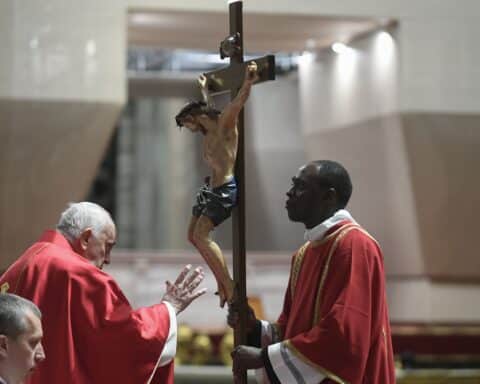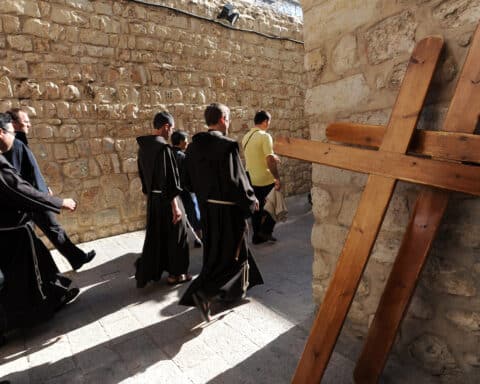Like God himself, grace cannot be contained, either by liturgical form or sacramental practice. Grace can be wild and unruly, breaking through the boundaries of polite behavior that we think we can set for it. Or grace can be mysterious and furtive, hiding in surprising places and mediated in unexpected but delightful ways. Of course, I do not gainsay the importance of the sacraments and their indispensable communication of grace. Nor do I deny the importance of liturgical consistency. But grace can also be found outside these forms if we allow our moral and spiritual imaginations to embrace the full goodness of God’s creation, including those artists who participate in that goodness, even if unwittingly. Toward this end, I suggest a short playlist of songs for finding grace — and cautionary notes — in our Lenten journeys.
Among the purposes of Lent is to prepare, through acts of repentance and reconciliation, for the culmination of the Christian mystery of the crucifixion and resurrection of Christ. We must learn how to forgive, not simply prepare to be forgiven. The Avett Brothers capture this essential aspect of Lent (and Christian spirituality more generally) in their song, “No Hard Feelings.” Pivoting on the question, “Will I be ready?” in the first verse, the song is an examination of conscience in future perfect tense. “When the sun hangs low in the west / And the light in my chest won’t be kept held at bay any longer / When the jealousy fades away / And it’s ash and dust for cash and lust,” will I be ready?
Or, as the name of the song asks, at the end of the journey will I have arrived at the place where I have “no hard feelings”? “Lord knows, they haven’t done / Much good for anyone / Kept me afraid and cold / With so much to have and hold.” The singer’s hard feelings — his grudges and accounts — have kept him alienated and at a distance from the very grace that can bring him salvation. He is learning that the hard feelings must give way, necessarily requiring being reconciled to his enemies. Or, rather, it will turn enemies to friends, as the song concludes: “It matters for me and you / To say it and mean it too / For life and its loveliness / And all of its ugliness / Good as it’s been to me / I have no enemies.”

Tom Waits’ song “Trampled Rose” illustrates that this is easier said than done, especially when those close to us have spurned, hurt and rejected us. Or, more generally, the song shows us how grudges and hard feelings can make us see things that might not really be there, or find offenses that don’t really exist. The singer finds a rose trampled in the road, and he is convinced that it must be the one he gave his lover. “I know that rose / Like I know my name / The one I gave my love / It was the same / Now I find it in the street / A trampled rose.” Now, of course, a rose is a rose. One is hardly distinguishable from another, especially when it is trampled “In the muddy street / With the fireworks and leaves.” But the singer is convinced that this rose must be the one he gave his love. And to find it in the street is to be spurned by his lover. How often do we find ourselves in the shoes of the singer? Or the misjudged, falsely accused lover? And how much more does this call us to heed the Avett Brothers’ admonition “to say and mean it too … I have no enemies.”
If we are not able to do this, we may find ourselves in the backseat of a limousine with Patty Griffin’s narrator on the “Long Ride Home,” contemplating our failure after it is too late to repair it. “Forty years go by with someone laying in your bed / Forty years of things you wish you’d never said / How hard would it have been to say some kinder words instead / I wonder as I stare up at the sky turning red.” But now, driving home from a funeral to an empty house, the opportunity is lost. “Headlights staring at the driveway / The house is dark as it can be / I go inside and all is silent / It seems as empty as the inside of me.” Lent is, at least in part, the time to be reconciled, even to those close to us whom we have neglected, disparaged or emotionally abandoned.
As Christians, we recognize that we do not travel into the Lenten desert alone. Of course, the symbolism of desertion is an important aspect of Lenten deprivation as we prepare for Easter abundance. But we do not cease to be “Easter people” even while we prepare for Easter through acts of penance and good works. On the contrary, Lent is the time that we consider the spiritual wasteland of a world in which Christ did not rise from the dead, and in which he does not walk with us in his resurrection. Or, as Johnny Cash so beautifully sings in Oscar Hammerstein’s classic song, “Walk on, walk on / With hope in your heart / And you’ll never walk alone.”
Kenneth Craycraft is a columnist for Our Sunday Visitor and an associate professor of moral theology at Mount St. Mary’s Seminary and School of Theology in Cincinnati. Follow him on Twitter @krcraycraft.





